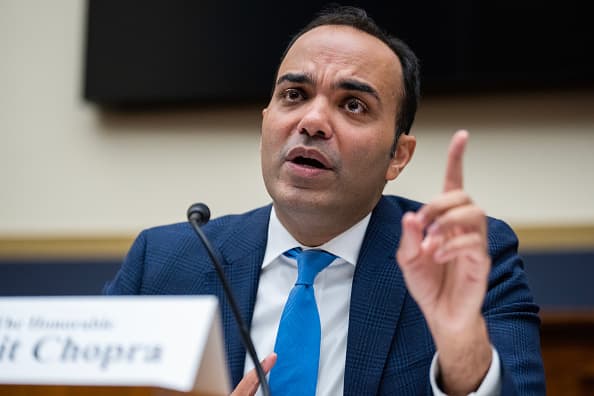
Rohit Chopra, director of the CFPB, testifies during a House Financial Services Committee hearing on June 14, 2023.
Tom Williams | Cq-roll Call, Inc. | Getty Images
The Consumer Financial Protection Bureau on Thursday announced the final version of a rule limiting banks’ ability to charge overdraft fees. It says the rule will save American consumers $5 billion annually.
The regulator said that banks could opt to charge $5 for overdrafts — a steep drop from the average fee of around $35 per transaction — or limit the fee to an amount that covers the lenders’ costs, or charge any fee while disclosing the interest rate of the loan.
“For far too long, the largest banks have exploited a legal loophole that has drained billions of dollars from Americans’ deposit accounts,” CFPB Director Rohit Chopra said in a statement. “The CFPB is cracking down on these excessive junk fees and requiring big banks to come clean about the interest rate they’re charging on overdraft loans.”
While overdraft fees have been a lucrative line item for the industry, generating $280 billion in revenue since 2000 according to the CFPB, banks’ revenue from the service has been on the decline. That’s because lenders including JPMorgan Chase and Bank of America have either reduced the fees or limited the types of transactions that trigger them, while some banks dropped the fee altogether.
The CFPB rule applies to banks and credit unions with at least $10 billion in assets.
The effort, part of a flurry of activity from the CFPB in the waning days of the Biden administration, faces stiff opposition from U.S. banking groups that have successfully stymied other efforts from the regulator. For instance, a rule capping credit card late fees at $8 per incident that was set to take effect in May has been held up in federal court.
The CFPB said its overdraft rule will take effect Oct. 1, 2025, though the rule’s ultimate fate is unclear.
Even before the presidential election victory of Donald Trump in November, the fate of the overdraft rule would have been murky, thanks to industry pushback. But Trump is expected to install a new CFPB head in January who is unlikely to support Biden-era efforts to rein in banking activity.
Bank lobbying groups have argued that the overdraft rule, first proposed in January as part of Biden’s war on junk fees, would reduce access to overdraft services and could send customers to worse alternatives, such as payday loans.
Later Thursday, the Consumer Bankers Association filed a lawsuit against the CFPB in Mississippi, claiming that the agency exceeded its authority and didn’t consider how its actions would impact consumers. The group chose a venue known as friendly to suits challenging federal regulators.
“While it is unfortunate, CBA had no choice but to pursue legal action to counter the CFPB’s blatant statutory overreach with its misguided rule to ensure consumers continue to have access to liquidity through overdraft services,” CBA President Lindsey Johnson said in a statement.
This article was originally published on CNBC

